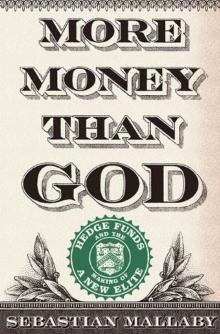More Money Than God_Hedge Funds and the Making of a New Elite


Author: Sebastian Mallaby
Category: Other3
Published: 2010
Series:
View: 581
Read OnlineAmazon.com ReviewSebastian Mallaby on Hedge FundsI set out to write the history of hedge funds for two reasons. Explaining the most secretive subculture of our economy posed an irresistible investigative challenge; and the common view of hedge funds seemed ripe for correction. Hedge funds were generally regarded as the least stable part of the financial system. Yet they managed risk better than banks, investment banks, insurers, and so on—and they did so without a safety net from taxpayers. Four years on, the book is done; and both my original motivations have been vindicated. Unearthing the story of hedge funds has been pure fun: From the left-wing anti-Nazi activist , A. W. Jones, to the irrepressible cryptographer, Jim Simons, the story of hedge funds is packed full of larger than life characters. Getting my hands on internal documents from George Soros’s Quantum Fund; visiting Paul Tudor Jones and reading the eureka emails he wrote in the middle of the night; poring over the entire set of monthly letters that the Julian Robertson wrote during the twenty year life of his Tiger fund; interviewing Stan Druckenmiller, Louis Bacon, and hundreds of other industry participants: my research has yielded a wealth of investment insights, as well as an understanding of why governments frequently collide markets. Meanwhile, the financial crisis of 2007-2009 vindicated my hypothesis that hedge funds are the good guys in finance. They came through the turmoil relatively unscathed, and never took a cent of taxpayers’ money. Since the book has come out, many readers have posed the skeptical question: Do hedge funds really make money systematically? The answer is an emphatic yes; and without giving the whole book away, I can point to a couple of reasons why hedge funds do outsmart the supposedly efficient market. First, hedge funds often trade against people who are buying or selling for some reason other than profit. In the currency markets, for example, hedge funders such as Bruce Kovner might trade against a central bank that is buying its own currency because it has a political mandate to prop it up. In the credit markets, likewise, a hedge fund such as Farallon might trade against pension funds whose rules require them to sell bonds of companies in bankruptcy. It’s not surprising that hedge funds beat the market when they trade against governments and buy bonds from forced sellers. Second, the hedge-fund structure makes people compete harder. There is an incentive to manage the downside: hedge-fund managers have their own money in their funds, so they lose personally if they take losses. There is an incentive to seek out the upside: hedge-fund managers keep a fifth of their funds’ profits. This combination explains why hedge funds were up in 2007, when most other investors were losing their shirts; it explains why they were down in 2008 by only half as much as the S&P 500 index. People sometimes suggest that hedge funds survived the subprime bubble by fluke—perhaps their ranks include wacky misfits who are naturally contrarian. But there is more to it than that. John Paulson poured $2 million in the research that gave him the conviction to bet against the bubble. The hedge-fund structure created the incentive to make that investment. Financial risk is not going away. Currencies and interest rates will rise and fall; there will be difficult decisions about how to allocated scarce capital in a sophisticated and specialized economy. The question is who will manage this risk without demanding a taxpayer backstop. The answer is hiding in plain sight: To a surprising and unrecognized degree, the future of finance lies in the history of hedge funds. --Sebastian Mallaby (Photo of Sebastian Mallaby © Julia Ewan) From Publishers WeeklyJournalist Mallaby (_The World's Banker_) gives unusually lucid explanations of hedge funds and their balancing of long and short positions with complex derivatives, but what really entrances him is their freedom from regulation, high leverage, and outsized performance incentives. In his telling, they empower a heroic breed of fund managers whose inspired stock picking, currency trading, and futures contracting outsmart the efficient market. In engrossing accounts of epic trades like George Soros's 1993 shorting of the pound sterling and John Paulson's shorting of subprime mortgages, the author celebrates hedge titans' charisma, contrarianism, and market insights. Mallaby contends that hedge funds benefit the economy by correcting market anomalies; because they put managers' money on the line and are small enough to fail, they are more prudent and less disruptive than heavily regulated banks. Mallaby's enthusiasm for an old-school capitalism of unfettered risk taking isn't always persuasive, but he does offer a penetrating look into a shadowy corner of high finance. (June) Copyright © Reed Business Information, a division of Reed Elsevier Inc. All rights reserved.
 The Boy Who Made the World Disappear
The Boy Who Made the World Disappear Signal Lost
Signal Lost The Adventures of Miss Barbara Pym
The Adventures of Miss Barbara Pym Apex Science Fiction and Horror Digest #10
Apex Science Fiction and Horror Digest #10 Bridge of Triangles
Bridge of Triangles Love Vs. Illusion
Love Vs. Illusion Cinderella Has Cellulite
Cinderella Has Cellulite The Churchgoer
The Churchgoer